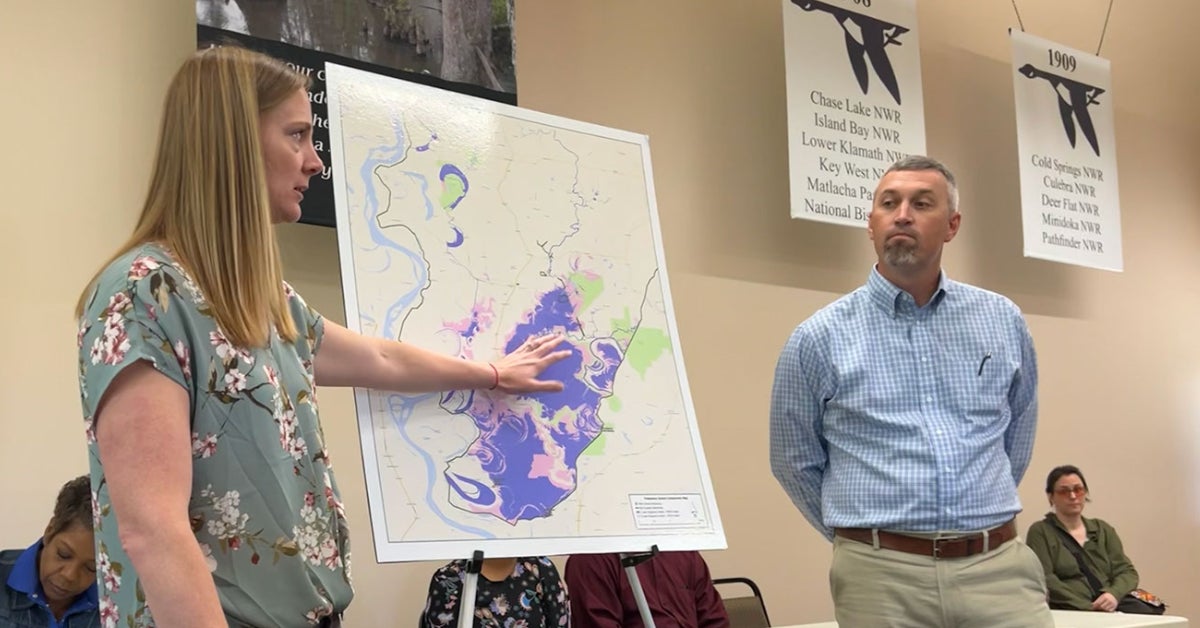Army Corps updates include Backwater Area Project
Published 8:28 pm Thursday, May 23, 2024

- EPA Yazoo Technical Lead Laura Shumway, left, and Vicksburg District Programs and Project Management Division Deputy Chief Jacob Brister present the proposed plan for the Yazoo Backwater Area in 2023 at the Theodore Roosevelt National Wildlife Refuge in Onward. (Photo by Anna Guizerix | The Vicksburg Post)
By Miranda Willson
The Army Corps of Engineers updated lawmakers on hot-button water and energy projects recently, including a World War II-era flood-control proposal.
The agency plans to issue a draft environmental impact statement for the Yazoo Backwater Area Project within the next 30 to 45 days, said Michael Connor, assistant secretary of civil works at the Army Corps.
First authorized by Congress in 1941 and most recently revived under both the Trump and Biden administrations, the project aims to address chronic flooding in the Mississippi Delta and improve agricultural operations.
But it faces opposition from environmental groups, who say it would harm wildlife, destroy sensitive wetlands and mostly benefit a few well-connected landowners.
“It’s very important that we continue to work on this project,” Connor said during a hearing before the Senate Appropriations Subcommittee on Energy and Water Development. “We expect there will be a lot of interest in [the environmental impact statement], but the goal is, by late fall, to have this process concluded.”
Connor’s comments came in response to questions from Sen. Cindy Hyde-Smith (R-Miss.), who has called water pumping the best solution to recurring floods in the southern Mississippi Delta.
While the hearing was called to review President Joe Biden’s proposed budget for the agency, much of the discussion focused on other lawmaker priorities.
Biden’s proposed budget for fiscal 2024 includes $7.2 billion for the Army Corps — 17 percent less than the agency’s current budget. Sen. John Kennedy (R-La.), ranking member of the subcommittee, said the proposed cut “makes no sense.”
“The corps actually saves us money,” Kennedy said, referring to the agency’s mission that includes controlling floods and mitigating environmental damages.
Connor said the budget request reflects the administration’s priorities for the agency, including modernization and innovation, ecosystem restoration, environmental resilience and community engagement.
Under the budget proposal, the office of the assistant secretary for civil works would get $6.4 million to respond to rising costs and demands, he added.
“Since 2009, my office has not received an appropriation larger than $5 million, in some years less. However, our costs, salaries, services, rent and travel supplies have continued to rise,” he said.
Kennedy also asked the corps about a massive proposed grain elevator in Louisiana, which would create about 100 jobs and is being built to export grain products, he said.
“It takes longer to get a permit for a project than it does to go to medical school,” Kennedy said. “When are we going to make a decision?”
The grain export project has faced controversy over its potential effects on historic properties in areas of significance to the descendants of enslaved people, as well as its location in what is informally known as “cancer alley.”
The Army Corps is currently waiting for guidance as to whether approving the project would adhere to the National Historic Preservation Act, Spellmon said. A decision will be made “very soon” as to whether further action is needed on historic preservation, he said.
Responding to the Yazoo pumps update, environmental advocates said they remained disappointed to see the Biden administration supporting the project.
“It’s an ag drainage project. It’s not about protecting people’s homes,” said Jill Mastrototaro, Mississippi policy director at Audubon Delta.





